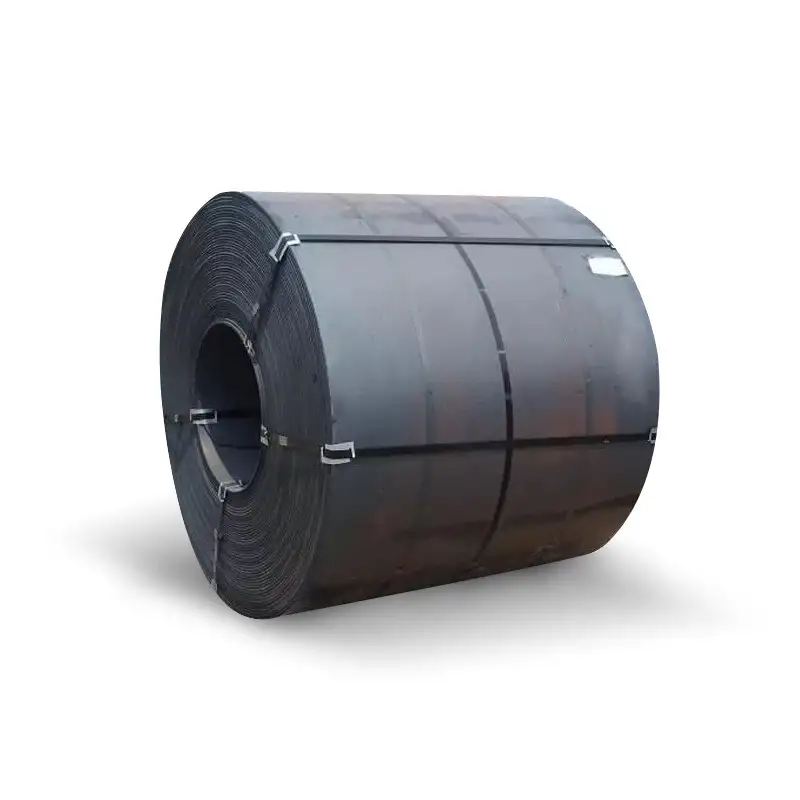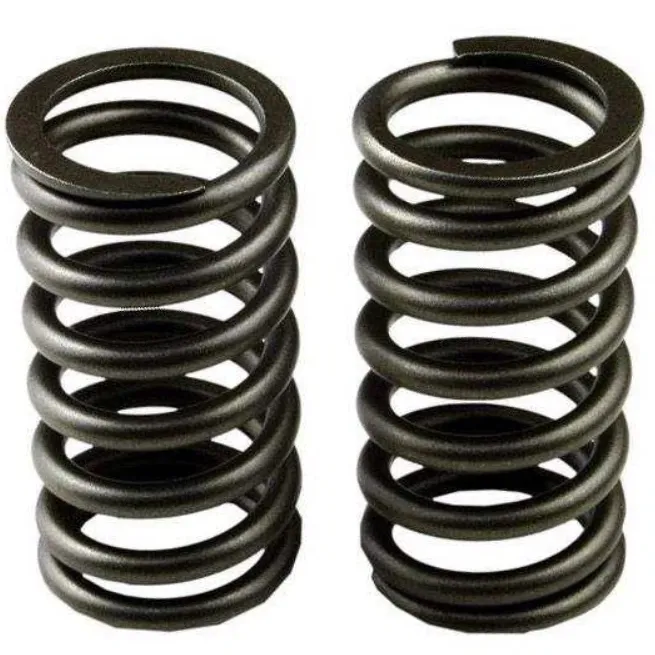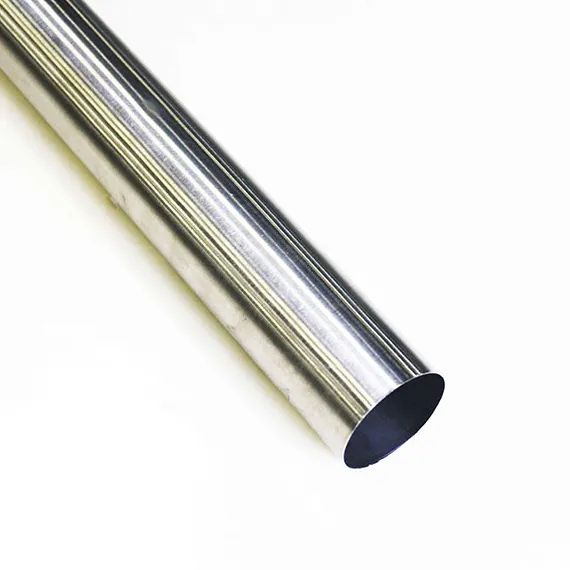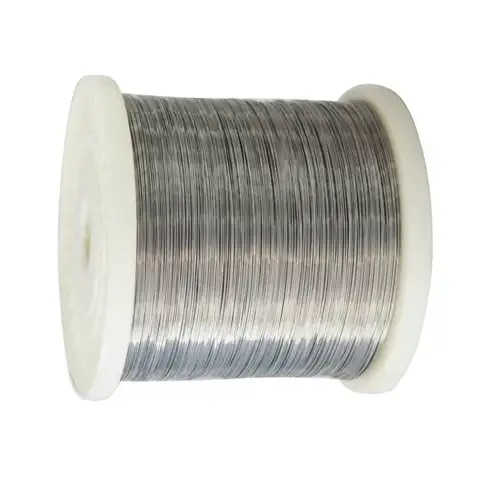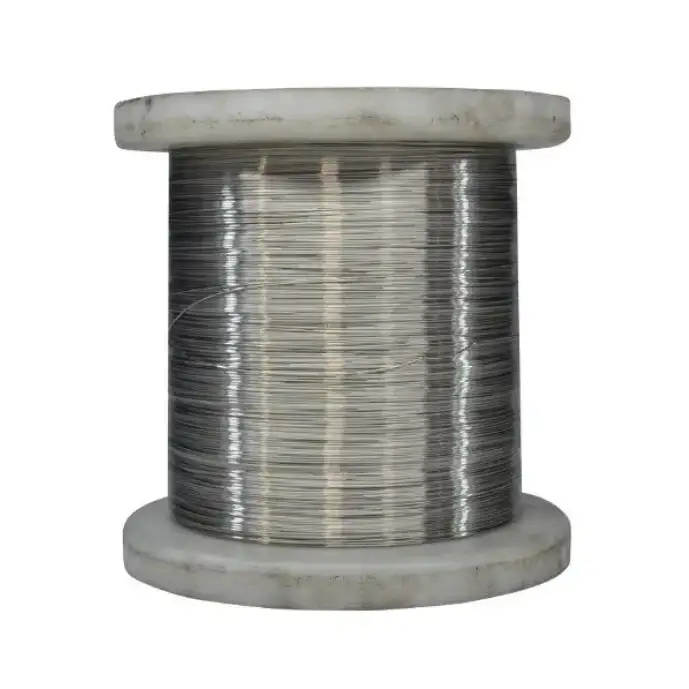A514 carbon steel coil is a family of high-yield, quenched-and-tempered alloy steels engineered for welded structural components that require very high strength combined with good toughness and acceptable formability. Typical A514 coils deliver minimum yield strengths around 690 MPa (100 ksi) in the thinner ranges, with tensile strengths commonly in the 760–895 MPa window depending on grade and thickness — making A514 an industry choice for cranes, heavy machinery booms, truck frames, and other high-load structures.
What is ASTM A514 steel?
ASTM A514 / A514M is the American standard covering high-yield-strength, quenched and tempered alloy steel plates intended primarily for welded bridge and other structural applications. Although the written standard refers to plates, A514 chemistry and heat-treatment practice are commonly applied to coils that are subsequently slit, cut-to-length, or processed into parts for heavy structural use. The specification defines multiple grades (commonly labeled A, B, E, F, H, P, Q, R, S, T and others historically) with small composition and testing differences.
Note: Grade availability varies by mill and thickness; not every grade is available in every thickness or coil form.
Typical mechanical properties
A514 steels are quenched and tempered to achieve very high yield strength while maintaining toughness. Properties depend on grade and thickness; the table below shows representative minimums commonly used in procurement and design documents.
| Thickness range (mm) | Minimum yield strength (MPa / ksi) | Typical tensile strength (MPa) | Minimum elongation in 50 mm (%) |
|---|---|---|---|
| 6 – 20 mm (thin coil-range) | ≥ 690 MPa (100 ksi) | 760 – 895 | ≥ 18% |
| 20 – 65 mm | ≥ 690 MPa (100 ksi) | 760 – 895 | ≥ 18% |
| 65 – 150 mm | ≥ 620 MPa (≈90 ksi) | 690 – 895 | ≥ 16–18% |
Key takeaways
-
The 100 ksi (690 MPa) yield is the hallmark for thinner delivery conditions; thicker products can have reduced minimum yield but still remain very high-strength.
-
Brinell hardness typical range: ~240–250 HB for many quenched-and-tempered conditions.
Chemical composition
A514 contains a low-to-moderate carbon base with alloying elements (Cr, Mo, V, Nb, Ti, B in small amounts) used to enable hardenability and control grain size during quench/temper. Exact composition depends on grade letter and manufacturer; the table below consolidates ranges commonly published by mills and datasheets (use for specification comparison and supplier audits).
| Element | Typical range (wt%) — consolidated (per grade variations exist) |
|---|---|
| Carbon (C) | 0.11 – 0.21 |
| Manganese (Mn) | 0.70 – 1.50 |
| Silicon (Si) | 0.15 – 0.45 |
| Phosphorus (P) | ≤ 0.035 |
| Sulfur (S) | ≤ 0.035 |
| Chromium (Cr) | 0.35 – 1.50 (most often 0.40–0.65) |
| Molybdenum (Mo) | 0.15 – 0.60 (commonly 0.15–0.25) |
| Vanadium (V) | 0.03 – 0.10 (trace additions for strengthening) |
| Titanium (Ti) | up to 0.10 (where specified) |
| Boron (B) | trace (0.0005–0.005) for hardenability in some grades |
Notes on table data: these consolidated ranges are based on grade tables in industry datasheets and commercial plate suppliers; consult the mill certificate (MTC) for the exact chemical breakdown on every coil shipment.
Specification & coil form factors
While ASTM A514 is written for plate, modern supply chains commonly provide coil processed to A514 chemistry and heat treatment and then slit or leveled. Procurement language should explicitly call out:
-
Grade (A/B/E/F/H/P/Q/R/S etc) and associated Charpy impact requirements (temperature & energy if required).
-
Thickness range and allowable tolerances (coils are usually specified in mm with a tolerance per ASTM A6/A6M or supplier tolerance sheet).
-
Surface finish (mill scale, pickled, oiled).
-
Heat treatment confirmation: quench & temper process control record and hardness locations.
-
Mechanical requirements (minimum yield, tensile, elongation) and specific thickness bands.
-
Testing: CVN (Charpy V-notch) if low-temperature service, full heat analysis, PMI on request, and ultrasonic or ultrasonic + magnetic particle/UT as required.
Specification table (procurement checklist)
| Item | Typical buyer instruction |
|---|---|
| Standard | ASTM A514 / A514M (specify year) |
| Grade | e.g., Grade B (or Grade Q for higher toughness) |
| Thickness | e.g., 3.0 – 12.0 mm coil (specify tolerances) |
| Yield / Tensile | e.g., Minimum yield 690 MPa at specified thickness |
| Impact | Charpy (if required): specify temperature (e.g., −20°C, 27 J) |
| Finish | Oiled; pickled if requested |
| Documentation | Mill Test Certificate (EN 10204 3.1 or equivalent) |
| Testing | Chemical, mechanical, CVN, ultrasonic/visual on request |
International equivalents & cross-reference table
No single EN grade is a perfect one-to-one match to A514 because of differing test regimes and delivery condition definitions, but practical equivalents are used in engineering substitution. Common cross-references:
| USA ASTM | Common European equivalent (approx.) | Notes |
|---|---|---|
| ASTM A514 (many grades) | EN S690Q / S690QL (EN 10025-6 family) | S690 series offers similar 690 MPa yield in certain thickness ranges; verify toughness and tempering. |
| ASTM A514 | EN S700 (some TMCP products) | For some applications S700MC or S700 variants are used depending on formability needs. |
| ASTM A514 | QStE690 (brand variants like Dillimax 690) | Mill product brands such as DILLIMAX 690 are marketed to meet comparable yield/toughness. |
Important: Equivalent grade selection should be validated by comparing mechanical limits, CVN toughness at the required temperature, and manufacturer delivery conditions. Mill datasheets (Dillinger, SSAB and other heavy plate producers) are authoritative when confirming interchangeability.
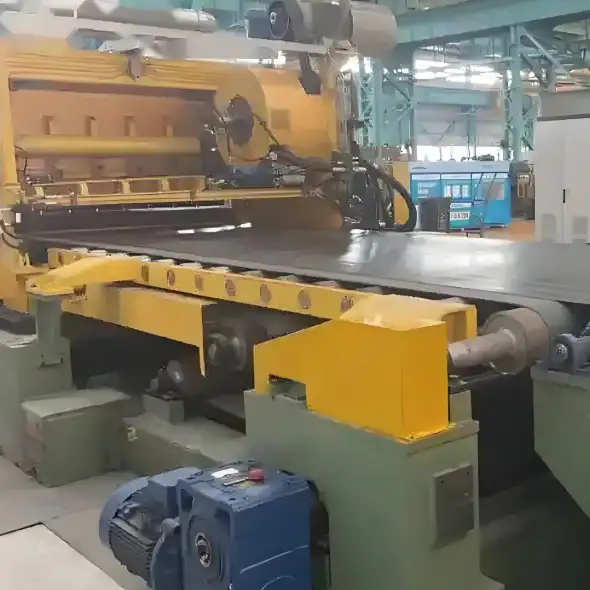
Manufacturing, heat treatment and metallurgical remarks
A514 steels achieve their properties through controlled alloying plus quenching and tempering. Typical manufacturing flow for coil form:
-
Melting & composition control in an electric arc furnace or basic oxygen melt followed by secondary metallurgy.
-
Hot rolling to coil thickness or slab rolling + coil processing.
-
Controlled austenitizing then rapid quench to form a martensitic/bainitic microstructure.
-
Tempering to reach the designed strength/toughness balance.
-
Coil leveling and finishing.
Weldability & fabrication:
-
A514 is weldable but requires appropriate preheat and interpass control for thicker sections and for specific grades; post-weld heat treatment is rarely done in the field, so qualified welding procedures per AWS / ASME and local codes are critical.
-
Machining and cold forming are more restricted than mild steels; formability decreases with strength. Where bending or forming is required, plan radii and tooling for high strength steel.
Coil surface, finishing, and tolerances
Coils can be supplied with mill scale (hot rolled), pickled (acid-cleaned), oiled, or with light coating for corrosion protection. For coil slit-to-width, common tolerances follow ASTM A6/A6M or the mill’s delivery program. If tight flatness and thickness control are required (e.g., for telescopic boom sections), specify TL (tight tolerance) products (mill brands often use “TL” or “precision” in their delivery programs).
Typical applications
-
Crane booms and structural members for lifting equipment
-
Truck and trailer frames and heavy vehicle parts
-
Mining equipment and wear-resistant structural parts (where toughness plus strength needed)
-
Heavy duty hydraulic cylinders, booms and armlike members
-
Structural bridges and high-load welded components
These uses capitalize on the high yield strength to reduce section thickness while maintaining load capacity.
2025 Price comparison — USA, Europe, China
Procurement prices for A514 vary by order size, quality grade, milling source, and logistics. Below is a consolidated market snapshot for 2025 ranges compiled from distributor listings, mill offers and export sellers (note: prices update frequently; use seller quotes for contract pricing).
| Region | Typical 2025 price range (USD / metric tonne) | Notes |
|---|---|---|
| China (FOB / export sellers) | $550 – $900 / MT | Competitive export offers from Chinese mills and traders; suitable for bulk. |
| United States (domestic mill / distributor) | $900 – $1,300 / MT | Domestic premiums, service center margins, and logistical costs raise prices. |
| Europe (mill/distributor) | $850 – $1,200 / MT | European branded products (Dillinger/SSAB) often command premiums but include traceable datasheets and mill branding. |
Procurement tip (MWAlloys advantage): MWAlloys sources A514 coils from established Chinese mills and offers factory-direct pricing and stocked coils for rapid shipment. For buyers seeking lower landed cost and fast turnarounds, factory dispatch from China combined with consolidated logistics can reduce total landed cost by a meaningful percentage versus local distributor purchases.
Pricing caveat: The ranges above are market indicators; final contracted prices depend on order volume, delivery Incoterm, thickness/grade, testing, and seasonal logistics.
Inspection, testing and recommended QA when buying coils
Ask for the following at minimum:
-
Mill Test Certificate (EN 10204 3.1 or equivalent) with full chemical and mechanical results.
-
Hardness map or representative hardness values if specified.
-
Charpy V-notch tests at required temperatures if service requires low temperature toughness.
-
Non-destructive testing certificates (UT/MT) where applicable.
-
Coil traceability: heat number to coil ID to plate pieces.
-
Surface and dimension report for slit coils.
These documents prevent surprise rejections at incoming inspection and are critical for structural projects.
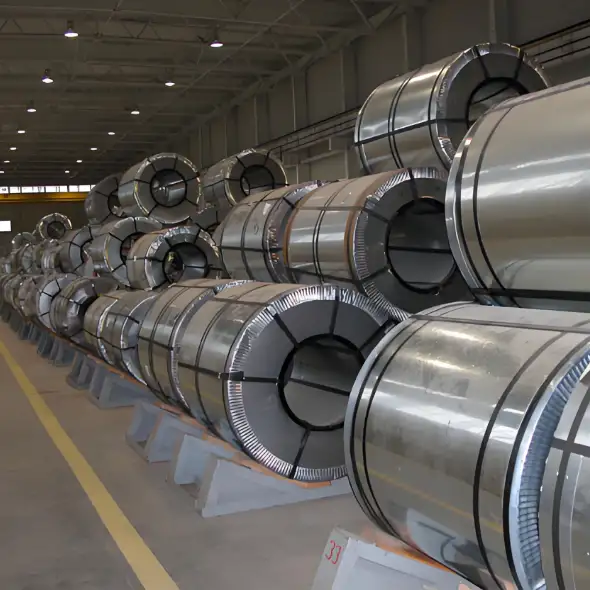
Storage, cutting, and handling best practices
-
Store coils under cover, off the ground, and protected from long-term moisture.
-
For slit coils, ensure correct sub-coil identification to preserve traceability.
-
When laser-cutting or plasma cutting high-strength steels, adjust cutting speed and gas because of increased carbon/alloy content.
-
For bending or forming, plan larger bend radii and consider local stress-relief procedures for thick sections.
Frequently asked questions
1) Is A514 the same as S690QL?
No exact identity exists; however, S690QL / S690Q (EN 10025-6 family) is often used in Europe to meet similar 690 MPa yield requirements in specific thickness ranges. Confirm toughness and delivery conditions before substituting.
2) Can A514 be provided in coil form for slit supply?
Yes. Mills and traders commonly supply A514 chemistry/HT in coil that is then slit or cut-to-length. Specify coil tempering history, flatness tolerance, and MTC requirements.
3) Is A514 weldable without preheat?
Weldability is acceptable with qualified procedures; preheat and interpass temperature control may be required for heavy sections to avoid hydrogen cracking. Follow AWS/ASME/WPS requirements.
4) What minimum yield should I expect?
For thinner delivery conditions typically 690 MPa; thicker products may have lower minimums (≈620 MPa). Always check the spec table for the chosen grade and thickness.
5) How does A514 compare to A36?
A514 is a high-yield, quenched-and-tempered alloy with far higher strengths (≈690 MPa yield) than A36 (≈250 MPa yield). Use A514 to reduce section size where strength is the controlling parameter.
6) Will A514 pass Charpy testing at sub-zero temperatures?
Some grades and supplementary heat treatments include Charpy requirements; specify required test temperature (e.g., −20°C or −40°C) and energy level in purchase order.
7) Are there standard equivalents for international procurement?
Common equivalents used for engineering substitution include EN S690Q/S690QL and branded products like Dillimax 690, but equivalence must be validated for toughness and delivery conditions.
8) What surface finishes are typical for coils?
Hot rolled with mill scale, pickled and oiled, or oiled only. For corrosion protection during storage or shipping, request rust preventive oiling or additional coatings.
9) How should I specify testing for critical structural use?
Request full chemical and mechanical certificates (EN 10204 3.1), CVN testing at the specified temperature, UT/MT where needed, and supplier process documentation for quench and temper cycles.
10) Can MWAlloys supply A514 with fast shipment?
Yes. MWAlloys maintains stocked A514 coils from qualified Chinese mills and offers 100% factory price options for buyers wanting rapid turnaround and lower landed costs. Contact MWAlloys for live stock and lead time.
Procurement checklist & specification template
-
Standard: ASTM A514 / A514M (specify year)
-
Grade: _______ (A, B, E, F, H, P, Q, R, S, T)
-
Thickness: ______ mm (specify tolerance)
-
Yield strength: ______ MPa (per thickness band)
-
Charpy: specify energy & temperature or “Not required”
-
Surface: Mill scale / Pickled + oil / Oiled
-
Documentation: MTC EN 10204 3.1; full heat analysis; UT/MT report if required
-
Packaging: strapped, wooden skids, oiled, covered
Quick technical risk list
-
Substituting EN grade without checking impact toughness can lead to brittle failures in low temperature service.
-
Purchasing without MTC or material traceability risks non-conforming deliveries.
-
Failing to plan welding procedures for high-strength steels risks cracking.
About MWAlloys
MWAlloys is a China-based steel materials supplier focused on high-strength structural alloys. For A514 carbon steel coil we offer:
-
Factory-direct pricing and mill relationships across major Chinese producers.
-
Stocked coils for rapid delivery and flexible coil slit & cut-to-length services.
-
Full technical support: mill certificates, mechanical/chemical traceability, and assistance matching EN/ASTM equivalents.
Contact MWAlloys for real-time stock lists, sample MTCs, and FOB or CNF offers.

